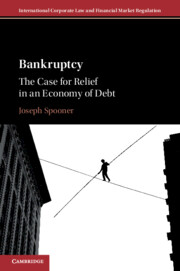Book contents
- Bankruptcy: The Case for Relief in an Economy of Debt
- International Corporate Law and Financial Market Regulation
- Bankruptcy: The Case for Relief in an Economy of Debt
- Copyright page
- Dedication
- Contents
- Figures
- Preface and Acknowledgments
- 1 Introduction
- 2 Financialised Capitalism and the Centrality of Household Debt
- 3 Consumer Bankruptcy Theory and the Case for Debt Relief
- 4 A Consumer Bankruptcy Marketplace
- 5 The Limits of Contractual Consumer Bankruptcy
- 6 The Austere Creditor: Austerity, Bankruptcy Policy and Government Debt Collection
- 7 Moral Hazard and Bankruptcy Abuse Prevention
- 8 Conclusion
- Index
6 - The Austere Creditor: Austerity, Bankruptcy Policy and Government Debt Collection
Published online by Cambridge University Press: 22 March 2019
- Bankruptcy: The Case for Relief in an Economy of Debt
- International Corporate Law and Financial Market Regulation
- Bankruptcy: The Case for Relief in an Economy of Debt
- Copyright page
- Dedication
- Contents
- Figures
- Preface and Acknowledgments
- 1 Introduction
- 2 Financialised Capitalism and the Centrality of Household Debt
- 3 Consumer Bankruptcy Theory and the Case for Debt Relief
- 4 A Consumer Bankruptcy Marketplace
- 5 The Limits of Contractual Consumer Bankruptcy
- 6 The Austere Creditor: Austerity, Bankruptcy Policy and Government Debt Collection
- 7 Moral Hazard and Bankruptcy Abuse Prevention
- 8 Conclusion
- Index
Summary
- Type
- Chapter
- Information
- BankruptcyThe Case for Relief in an Economy of Debt, pp. 174 - 215Publisher: Cambridge University PressPrint publication year: 2019
- 1
- Cited by

